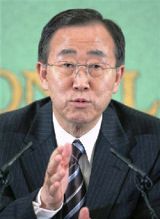UN chief urges help to arrest Sudanese suspects in Darfur crimes
December 3, 2007 (UNITED NATIONS) — Secretary-General Ban Ki-moon urged all countries on Monday “to do everything in their power” to help arrest two Sudanese accused of crimes against humanity in conflict-wracked Darfur.
 The International Criminal Court, the world’s first permanent war crimes tribunal, has issued warrants for the arrest of the seven men. But the Sudanese government has said repeatedly it will never hand over any of its citizens.
The International Criminal Court, the world’s first permanent war crimes tribunal, has issued warrants for the arrest of the seven men. But the Sudanese government has said repeatedly it will never hand over any of its citizens.
In an address to the court’s annual two-week meeting, Ban recalled the launch of the tribunal in July 2002 and noted “with some satisfaction” that two individuals indicted by the court — rival Congolese militia leaders — have been arrested and transferred to The Hague, Netherlands for trial.
“I urge all member states to do everything within their powers to assist in enforcing these warrants,” he said, stressing that “the single most important determinant of success for any international tribunals is cooperation.”
“Of course, the arrest and surrender of indicted individuals can only be undertaken by states, even where peacekeeping operations have been mandated to assist with the task,” Ban said.
The tribunal has issued arrest warrants for former Sudanese interior minister Ahmed Muhammed Harun, who was in charge of security in Darfur and was appointed Sudan’s humanitarian affairs minister after his indictment was announced, and Ali Kushayb, known as a “colonel of colonels” among the janjaweed militias who have terrorized Darfur villages.
Sudan’s U.N. ambassador, Abdalmahmood Abdalhaleem Mohamad, reiterated again on Monday that “our people will not be handed over to the Hague for any trial.”
The conflict in Sudan’s western Darfur region has claimed over 200,000 lives and uprooted 2.5 million people from their homes since violence erupted in early 2003 when rebels from the ethnic African majority took up arms against the Arab-dominated government. Critics accuse Sudan of retaliating by arming the janjaweed, and the government is blamed for widespread atrocities against civilians — which it denies.
Ban said that “in Darfur … unspeakable crimes on a massive scale are still being committed.”
The court’s meeting opened Friday with tough words from its president, Judge Philippe Kirsch, and its chief prosecutor, Luis Moreno-Ocampo, on the obligation to enforce the tribunal’s arrest warrants.
Richard Dicker, director of the international justice program at Human Rights Watch, said Friday that without a tough message from Ban, the Sudanese government may get the idea they “can flout this court at will without facing repercussions from the leadership of the United Nations.”
The International Criminal Court can prosecute cases of genocide, war crimes and crimes against humanity, but it will step in only when countries are unwilling or unable to dispense justice themselves.
Sudan is not one of the 105 countries that have ratified the 1998 Rome statute, which established the court, but the U.N. Security Council referred the Darfur case to the International Criminal Court in 2005 in a resolution that required Sudan’s government and all other parties in the conflict to cooperate.
Sudan’s Mohamad said Monday that “we are not at all concerned by what he (Ban) said because we are not party to the Rome statute, and I don’t think that the secretary-general is encouraging piracy — for countries to engage in unlawfully arrest people whom they have no jurisdiction over.”
“The Security Council is a political organization and this (court) is a legal body, not part of the U.N. apparatus, and the secretary-general and the Security Council has no role at all in these things,” he said.
“Ocampo is an enemy of the peace process in Sudan,” Mohamad said. “He’s playing politics. … He’s singing a song that would entertain some people here, but will destroy the peace in the country, and we will never allow that to happen.”
“Our judiciary system is very capable of trying whoever is accused,” Mohamad said.
(AP)
